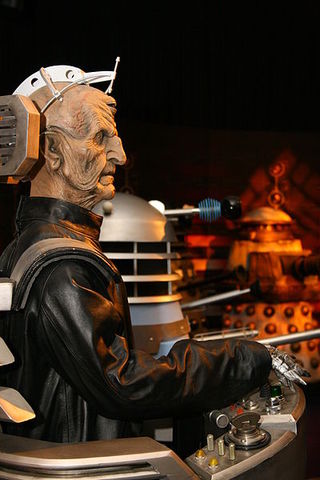Psychopathy
Are Psychopaths Really Smarter Than the Rest of Us?
Research addresses some popular myths about psychopaths' abilities.
Posted December 11, 2016 Reviewed by Lybi Ma

When lay people think about a psychopath, they may, quite reasonably, think of someone who's potentially very dangerous, or even evil. Yet they may also picture someone who's highly intelligent. However, research shows that psychopaths are no more likely to be highly intelligent than the average person. So why does this misconception occur? Popular culture, with its frequent portrayals of “evil genius” characters, may be partly to blame. Yet this misconception might also reflect something about the way people perceive the nature of intelligence. That is, people may associate high intelligence with emotional coldness and disregard for social norms, whether or not this is really true.
Psychopathy is a personality disorder associated with extreme callousness and a willingness to exploit others and violate their rights. Although not all people who might be regarded as psychopaths commit crimes, they have considerably higher rates of criminality and violence than other people.
Lay people tend to have a number of misconceptions about psychological disorders, and this seems to apply to their understanding of psychopathy as well. In one study, people were asked to read a series of statements about psychopathy, and rate how much they agreed each statement is true (Furnham, Daoud, & Swami, 2009). Most participants were likely to agree with statements like “Psychopaths are often highly intelligent” and “Psychopaths are very socially skilled and competent in most social situations.” The latter statement contains a grain of truth: Psychopaths tend to be socially bold and highly confident, and possess superficial charm that they use to manipulate others. However, there is no evidence that they are more likely to be highly intelligent than the average person. A review of studies found that the correlation between psychopathy and intelligence is nearly zero, suggesting that most people with psychopathic traits are neither highly intelligent nor particularly dull (O’Boyle, Forsyth, Banks, & Story, 2013).
In another study, people participating in a mock jury were asked to rate their perceptions of a defendant in a murder trial based on a brief summary of the case (Edens, Clark, Smith, Cox, & Kelley, 2013). Participants rated the defendant on how strongly they possessed 20 psychopathic traits, which were derived from the Psychopathy Checklist Revised (PCL-R), used by psychologists to assess psychopathy. The PCL-R assesses two broad factors of psychopathy: Factor 1, called primary psychopathy, is associated with shallow affect, low empathy, and interpersonal coldness. Factor 2, called secondary or hostile/reactive psychopathy, is associated with aggressive, impulsive, antisocial behavior and socially deviant lifestyles.
The defendant was also rated on several other psychological and behavioral characteristics, including intelligence, boldness, dangerousness, and evil. Participants who rated the defendant high in psychopathic traits also tended to rate him as highly bold, intelligent, dangerous, and evil. This was true of ratings of the defendant on Factor 1 (primary psychopathy) traits, although not entirely true of ratings of Factor 2 (secondary psychopathy) traits, which were predicted by boldness, dangerousness, and evil, but not intelligence.
People tended to associate intelligence with the emotionally cold Factor 1, but not with the more emotionally reactive Factor 2. This, despite the fact that the case vignette contained minimal information, with nothing that would indicate intelligence (e.g. there was no information about the defendant’s general knowledge, professional skills, or education).
Interestingly, participants were also asked who was the first person (real or fictional) who came to mind when they heard the word “psychopath” or “sociopath”—and 90 percent of respondents could identify someone in this category. People were also more likely to draw on real-world examples than fictional ones. The majority identified serial killers or mass murders (e.g. Charles Manson), while the next most popular response concerned political figures (e.g. Hitler), while only a small minority (8 percent) identified a fictional character (e.g. Hannibal Lecter).

Psychopaths tend to be cold-hearted—emotionally detached from others—and criminals with psychopathic traits can plan serious crimes in a calm, calculating manner. Therefore, they present an image of people with cold hearts and cruel brains. As I discussed in a previous post, those who self-identify with their head tend to see themselves as more logical and intellectual, and yet they are also emotionally colder than people who self-identify with their heart. Additionally, people who are more in their head tend to be lower in agreeableness than people who are more in their heart (Fetterman & Robinson, 2013).
Agreeableness is a personality trait associated with concern for other people; psychopathy is consistently associated with low agreeableness (Decuyper, De Pauw, De Fruyt, De Bolle, & De Clercq, 2009). Similarly, studies on self-assessed intelligence have found that people who rate themselves as highly intelligent tend to be low in agreeableness (Chamorro-Premuzic & Furnham, 2006; Chamorro-Premuzic, Furnham, & Ackerman, 2006). This is quite curious, because a review of studies found that objectively measured intelligence is unrelated to agreeableness—the average correlation between the two is close to zero (DeYoung, 2011). This suggests that people who are low in agreeableness tend to overestimate how intelligent they really are, while those who are high in agreeableness tend to be more modest, and underestimate their true ability. To be fair, most people probably have a reasonably accurate idea of how intelligent they are, but such accuracy can be distorted to some extent by personality traits, particularly agreeableness.
And as I noted in a previous post, there are some discrepancies between personality traits that people tend to regard as socially desirable and those they regard as intelligent. One study found that people rated traits of trust, honesty, compliance, and modesty as socially desirable, yet they did not consider these traits to be characteristic of intelligent people (Mõttus, Allik, Konstabel, Kangro, & Pullmann, 2008). People with these qualities may be generally regarded as nice, but not particularly smart, regardless of whether this is objectively justified.
What these studies suggest is that, although intelligence is highly valued, lay people may be concerned that highly intelligent people are more inclined to the dark side. This could help explain the misconception that psychopaths are highly intelligent, although admittedly this is speculative. Certainly, people of high intelligence have the potential to abuse their gifts for nefarious purposes: Evil geniuses do exist. Perhaps then it might be fair to say that highly intelligent people are not more likely than others to turn evil, but when they do, their potential for doing harm might be amplified due to greater mental ability.
© Scott McGreal. Please do not reproduce without permission. Brief excerpts may be quoted as long as a link to the original article is provided.
Other posts about psychopathy:
- What Is the Link Between Heroism and Antisocial Behavior?
- What Do Heroes and Psychopaths Have in Common?
- Is emotional intelligence relevant to psychopathy?
Other posts about intelligence:
- What Is An Intelligent Personality?
- When Being Nice Gets in the Way of Being Smart
- The Illusory Theory of Multiple Intelligences
- The Knowledgeable Personality
- Intelligence And Politics Have a Complex Relationship
Image credit: Davros and Daleks as seen on the Doctor Who Experience, Wikimedia Commons
References
Chamorro-Premuzic, T., & Furnham, A. (2006). Personality and self-assessed intelligence: Can gender and personality distort self-assessed intelligence? Educational Research and Reviews, 1(7), 227-233.
Chamorro-Premuzic, T., Furnham, A., & Ackerman, P. L. (2006). Ability and personality correlates of general knowledge. Personality and Individual Differences, 41(3), 419-429. doi:10.1016/j.paid.2005.11.036
Decuyper, M., De Pauw, S., De Fruyt, F., De Bolle, M., & De Clercq, B. J. (2009). A meta-analysis of psychopathy-, antisocial PD- and FFM associations. European Journal of Personality, 23(7), 531-565. doi:10.1002/per.729
DeYoung, C. G. (2011). Intelligence and Personality. In R. J. Sternberg, & Kaufman, S. B. (Ed.), The Cambridge handbook of intelligence (pp. 711-737). New York: Cambridge University Press.
Edens, J. F., Clark, J., Smith, S. T., Cox, J., & Kelley, S. E. (2013). Bold, smart, dangerous and evil: Perceived correlates of core psychopathic traits among jury panel members. Personality and Mental Health, 7(2), 143-153. doi:10.1002/pmh.1221
Fetterman, A. K., & Robinson, M. D. (2013). Do you use your head or follow your heart? Self-location predicts personality, emotion, decision making, and performance. Journal of Personality and Social Psychology, 105(2), 316-334. doi:10.1037/a0033374
Furnham, A., Daoud, Y., & Swami, V. (2009). “How to spot a psychopath”: Lay theories of psychopathy. Social Psychiatry and Psychiatric Epidemiology, 44(6), 464-472. doi:10.1007/s00127-008-0459-1
Mõttus, R., Allik, J., Konstabel, K., Kangro, E.-M., & Pullmann, H. (2008). Beliefs about the relationships between personality and intelligence. Personality and Individual Differences, 45(6), 457-462. doi:http://dx.doi.org/10.1016/j.paid.2008.05.029
O’Boyle, E. H., Forsyth, D., Banks, G. C., & Story, P. A. (2013). A meta-analytic review of the Dark Triad–intelligence connection. Journal of Research in Personality, 47(6), 789-794. doi:http://dx.doi.org/10.1016/j.jrp.2013.08.001




